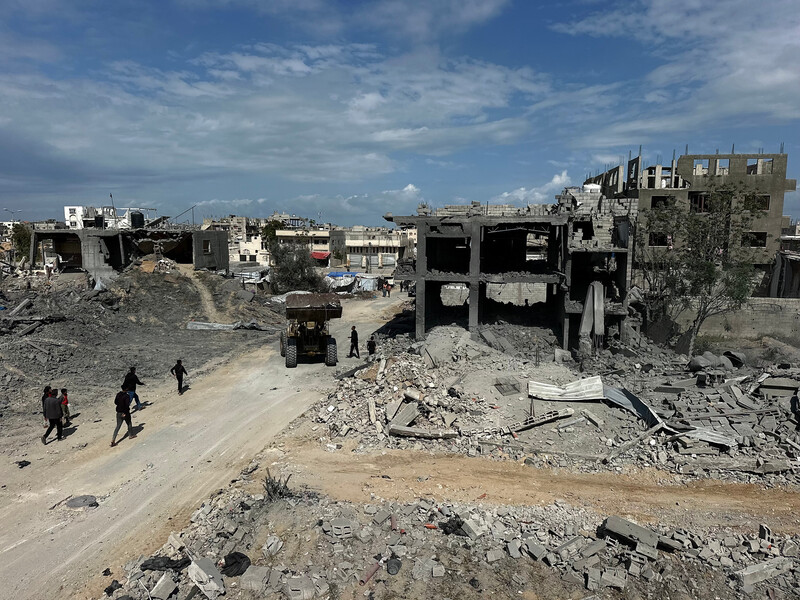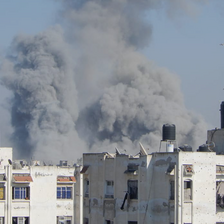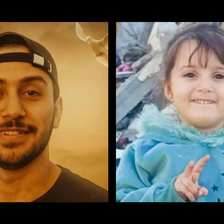The Electronic Intifada 3 June 2025

Israel bombed tents and buildings housing displaced people in Khan Younis, the southern Gaza Strip, 13 April 2025.
APA imagesMy brother Karim was fetching water for our family on 28 April in the late morning.
We live in Khan Younis near Nasser Medical Complex, which provides a water access point that is open at set times.
Still, Karim has to carry the water all the way up to our apartment on the fifth floor – a task that usually takes him over 40 minutes.
As Karim was absent, I moved his wooden desk from his room to the living room in an attempt to redecorate our apartment.
Karim fetched over four gallons of water and accidentally spilled some in the entryway and on the floor.
My mother didn’t get upset about that – this spilling has become a daily routine after fetching water.
Karim sat at his desk to rest. My mother, with her usual touch of care, told me to pour Karim a cup of warm, bitter tea.
We had run out of sugar, and it was unavailable in the markets – and when it was, the prices were astronomical.
I grabbed the teapot and a glass, walked over to Karim and poured him a cup of dark brown tea, steam gently rising from it.
Before his lips could taste its warmth, Karim murmured: “Ya Allah! How quickly time has passed. I don’t have much time left.”
It was 11:40 am – only twenty minutes remained before Karim’s math class began.
Karim is 18 years old, a tawjihi student, striving hard to graduate so he can attend university.
With no schools operating, he relies on YouTube videos for lessons. At times, he turns to me for help reviewing the material after class.
Karim hurriedly put on his shirt, leaving the cup of tea to cool on his old wooden desk, and rushed out in less than a minute.
I stepped out onto the balcony and watched as Karim walked away – a small dot moving quickly down the street until he vanished from view.
Waiting for Karim
I went back inside to finish my chores before studying for my translation exam.
About two hours later, I joined my mother to prepare lunch: eggplant and chickpea stew.
We sat cross-legged in the living room, and I helped my mother pour the steaming stew onto plates.
My mother set aside a plate for Karim, knowing his hour of return was approaching.
We began eating without him, as he was late, but we left his plate in its place, waiting for him to return.
We finished eating, and Karim’s plate remained untouched. Sometimes his math teacher would extend the class to cover more material – and that is what we thought had happened.
I went to my room to continue studying for my translation exam.
As soon as I turned on my laptop, my other brother Hussein, who is in medical school in Egypt, called me.
I was very busy, as the translation exam was in a few hours, so I handed the phone to my sister Lubna to hand it to my mother.
Less than a minute passed when I heard my mother’s scream piercing the silence of the house as she anxiously asked: “Which hospital is he in?”
I jumped from my chair and rushed to my mother’s side with questions in my mind: Who? How? Why?
As my mother hung up the call, she said, “Call your brother Hassan and tell him Karim is injured.”
My mother cried: “Ya Allah, protect Karim.”
I felt like I was going to suffocate.
My hands started to tremble.
I dialed Hassan’s number and handed the phone to Lubna, as I needed to get dressed.
My mother, my younger brother Salman and I jogged to Al-Amal Hospital in the center of Khan Younis, where Karim had been taken.
I felt as though a rock were crushing my chest, suffocating me more and more.
My mother told me that the doctor in charge of Karim’s case was Hussein’s childhood friend, so he called Hussein and informed him.
The 30-minute walk to the hospital took us just 10 minutes.
When we arrived, Hassan was already there. With a worried expression, he said: “Karim was hit by three pieces of shrapnel – two in his shoulder and one in his back.”
Karim was lying on a hospital bed, and the doctors told him not to move. My mother and I started crying the moment we saw Karim.
The doctors, limited by a lack of resources, could do nothing for Karim. He was sent home the same day.
Class postponed
Karim explained that when he arrived for his math lesson, the teacher had postponed the class by an hour because he hadn’t yet finished with the previous group.
“So I went to a nearby mosque to pray,” Karim said. “Then I ran into my friend Hamza, who was riding his motorcycle.”
Karim had known Hamza al-Sha’er, 17, since they were in the third grade. Hamza was a close friend of ours – he used to visit us often in the Qizan al-Najjar neighborhood before we relocated to the area near Nasser Medical Complex in October 2024.
Karim and Hamza chatted for a bit, and Karim told him how much he missed the old neighborhood.
“Why don’t I take you on my motorcycle to see it?” Hamza offered. “Then I’ll drop you off at your class so you won’t be late.”
Karim agreed without hesitating.
On their way, Hamza ran into another friend, Muhammad, who was also from our neighborhood. Hamza shared the idea of visiting the neighborhood, and Muhammad agreed to join them.
When they approached Ramadan Restaurant – just a few meters from our old neighborhood – Hamza stopped the motorcycle, worried that the Israeli army might target them, as it often targets vehicles.
They continued on foot until they reached our neighborhood – Qizan al-Najjar.
“Drones started flying very close,” Karim recalled. “Their buzzing grew louder, like the sound of angry bees.”
Then Karim heard the distinct whistling of a missile descending.
“I felt a cold fear rush through my veins,” he said.
Nobody moved.
The missile struck just a few steps ahead, carving a large crater into the ground – but it didn’t harm anyone.
Karim, Hamza and Muhammad scattered in different directions to take cover – Hamza and Muhammad ran to the right while Karim darted to the left.
After a few seconds, two more missiles struck near the same location.
“I heard a deafening explosion,” Karim recounted. “Then I felt heat and pain spreading through my body.”
He had been hit in the shoulder and back by pieces of Israeli shrapnel.
Hamza was struck in the abdomen, leaving a dark red stain.
Muhammad tried to stand but collapsed again, fainting from a chest wound.
“I rushed into a nearby barbershop and tied a towel around myself, trying to stop the bleeding in my back,” Karim said.
“For more than an hour, the zanana hovered overhead like a ghost,” he continued. “Hamza and Muhammad lay motionless in the street, moaning now and then – until their voices faded.”
As the buzzing of the drone slowly disappeared, so did their moans. Hamza and Muhammad had succumbed to their injuries.
A neighbor – who had come to check on his house, bombed by Israel the day before – approached Karim and said in a low, cautious voice: “Leave your backpack, take off your bloody shirt, raise your hands and walk back to Ramadan Restaurant. I’ve called an ambulance – it’s waiting for you there.”
Karim did as he was told. He walked with his hands raised until he reached the area near Ramadan Restaurant, where he found the ambulance waiting. Paramedics rushed him to Al-Amal Hospital.
My brother Karim was on his way to a math lesson, carrying nothing but a textbook, a notebook and two pens – the simple tools of a student.
He just wanted to learn.
Karim was not a threat.
Donya Ahmad Abu Sitta is a writer in Gaza.





